If you’ve been searching for a top-of-the-line whole-home water filtration solution, you’ve probably stumbled upon Leaf water systems. At first glance, it’s easy to feel tempted to buy this product.
After all, the company’s marketing promises crisp, pure-tasting water, an easy installation process, and stellar support. But before you rush out and sign on the dotted line, let’s take a closer look.
In this detailed review, I’ll share my honest perspective, including the good, the bad, and the downright frustrating aspects. By the end, you’ll know whether this is something you truly want to bring into your home.
My Experience With Leaf Water Systems
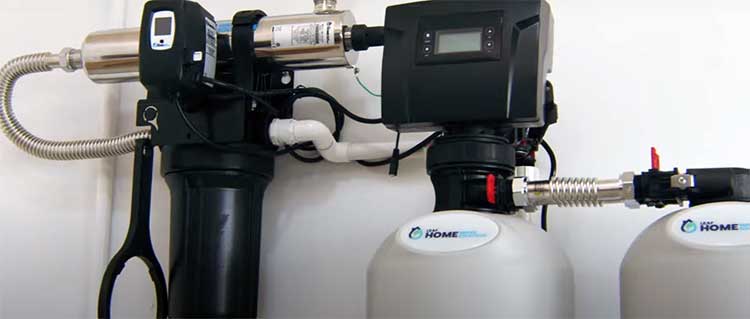
I remember the first time I heard about Leaf water systems. I was deep into research mode, trying to find a water filtration solution that could handle my entire home.
With so many options out there—ranging from small countertop units to massive whole-house rigs—I was feeling a bit lost. Then Leaf caught my eye with its marketing claims: a high-quality whole-home filtration system that claimed to deliver bottled-water-like quality straight from every faucet.
At a time when water quality was becoming more of a concern, the idea was appealing. I wanted something that would not only improve the taste but also potentially remove harmful contaminants.
But let’s be honest: deciding on a system like this is no small choice. You’re not just buying a pitcher filter or a simple under-sink attachment; you’re investing in a large-scale system that will (hopefully) serve you for years.
The promise from Leaf’s promotional materials sounded incredible: top-tier quality, top-tier service, and a huge improvement in the everyday experience of using water. My initial excitement was pretty high.
I was picturing the convenience of stepping into the shower knowing the water was filtered and fresh, and the comfort of not worrying about the kids filling their water bottles from the kitchen tap.
As I looked deeper, I also noticed mixed feedback from various review platforms. Some users claimed it worked wonders. Others, though, seemed disappointed, especially when it came to service and installation quality.
The differences in opinions put me in a tricky spot. There’s nothing worse than spending thousands on a home improvement only to discover subpar service or performance. So I decided to dive in deeper, compare Leaf to other well-known brands, and think long and hard before making any recommendation.
Pros of Leaf Water Systems
Let’s start by analyzing what Leaf water systems promises to get right. You might be wondering: “Is there anything good here?” Even if I’m not going to recommend it overall (because the experiences seem to tilt negative), it’s only fair to share some potential upsides.
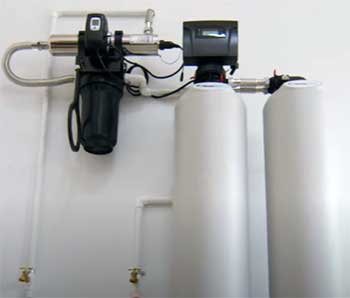
- Claims of Comprehensive Filtration: Leaf’s marketing highlights a wide range of contaminants they say their system can reduce. They suggest you’ll get rid of chlorine, sediments, certain chemicals, and possibly even heavy metals. If everything worked as advertised, you’d have water that tastes great, smells better, and is gentler on your appliances and plumbing.
- Whole-Home Convenience: Instead of installing individual filters on each faucet, a single system at your home’s main water supply line would, in theory, filter every drop of water entering your home. This means showers, laundry, and even that hose water you use to fill a pet’s bowl would be filtered. The convenience factor can’t be denied.
- Potential for Better Taste: For people living in areas where the tap water tastes a bit off, the idea of turning on any faucet and getting water that doesn’t taste like chlorine is attractive. Even skeptics admit that when a whole-house system works right, it can improve the overall flavor profile of your water. If Leaf delivered on this consistently, it would be a big plus.
- Customizable Options: Leaf does offer various models and options, sometimes bundling water softeners or specialized filters to tackle local water issues. If your water supply is particularly hard or contains specific contaminants, there might be a Leaf configuration designed to handle it.
Cons of Leaf Water Systems
Now it’s time for the not-so-great part. Honestly, this is where I find the biggest red flags. I won’t sugarcoat it: the negative feedback I’ve come across is concerning enough to give me serious pause.
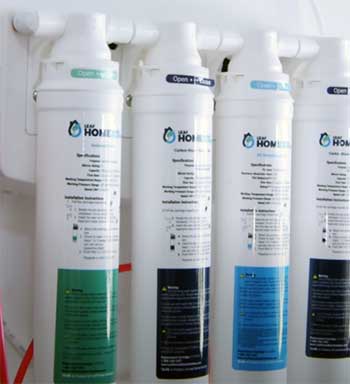
- Inconsistent Installation Quality: Several negative reviews highlight poor installation experiences. Customers have reported installers leaving before completing the job, cutting lines they weren’t supposed to, and failing to properly bury drain lines. When you invest in a whole-house system, you expect professional workmanship. Seeing complaints about sloppy installations is a major turn-off.
- Lackluster Customer Service: The company often promises “white glove” service, yet many customers claim they never received it. People talk about struggling to get call-backs or follow-up visits. Some even mention being charged hefty fees for service calls that don’t solve the underlying issues. The sense is that once Leaf has your money, getting timely support might be an uphill battle.
- Unresolved Technical Issues: There are reports of water still looking murky or tea-colored after installation. Even after multiple attempts at fixing the system, some customers ended up stuck with poor results. When a system is supposed to filter impurities but you still see discolored water, that’s a big problem. If the product doesn’t improve your water’s quality reliably, what’s the point?
- High Repair and Maintenance Costs: The idea of spending hundreds just to get your system working as promised after installation is downright frustrating. People have mentioned escalating fees, with service costs climbing into hundreds of dollars to address ongoing problems. Rather than a set-it-and-forget-it system, you might end up shelling out more money just to achieve the basic quality you were initially sold on.
- Communication Gaps: One huge frustration I’ve seen is the communication disconnect. When customers complain or leave bad reviews, the company often responds with a canned reply or a link, but actual follow-through appears to be lacking. When spending a significant amount on a whole-house system, the least you should get is responsive, meaningful communication.
Maintenance Tips for Leaf Water Systems
If, after weighing the pros and cons, you still decide to go for a Leaf water system, you’ll need to know how to maintain it. Good maintenance can sometimes compensate for less-than-stellar aspects, though it’s not a cure-all if the fundamental product and service are flawed. I’d suggest the following:
- Regular Filter Changes: Make sure you know the recommended interval for filter replacements. Even the best filtration systems need consistent upkeep. Mark it on your calendar or set a phone reminder. Clean, unblocked filters ensure better water quality and performance.
- Professional Tune-Ups: If you’re not handy with plumbing, consider hiring a trusted local plumber (not necessarily Leaf’s own team, based on complaints) to give the system an annual check-up. A knowledgeable professional can spot minor issues before they become big problems—just be prepared to pay for this out of pocket if Leaf support isn’t reliable.
- Watch for Pressure Changes: If you notice a drop in water pressure, it may indicate something’s off with the filters or the installation. Don’t ignore these signs. The sooner you address it, the less likely you’ll face severe damage or costly repairs down the line.
- Keep Good Records: Document everything—when filters are changed, who you spoke to at Leaf (if you manage to get through), and any issues that arise. Detailed records can help if you ever need to escalate a complaint or switch to a different provider later on.
- Consider a Water Test: Test your water both before and after installing the system. If you’re paying top dollar for filtration, you should have hard evidence that it’s making a difference. Testing kits are relatively affordable and can give you quantifiable data to confirm whether your system is doing its job.
Comparing Leaf Water Systems To Other Brands
When I was on my quest for the perfect whole-house filtration system, Leaf wasn’t the only name on my list. Many companies offer similar products, and I think it’s important to see how Leaf stacks up, especially since I’m not inclined to recommend them.
Leaf Water Systems Vs. Kinetico Water System
When I first started exploring whole-house filtration options, I looked at Leaf water systems alongside well-established names like Kinetico. Now, Kinetico Water System is a brand that often comes up in discussions about reliability and performance. If you’re trying to decide between Leaf and Kinetico, here are some key differences.
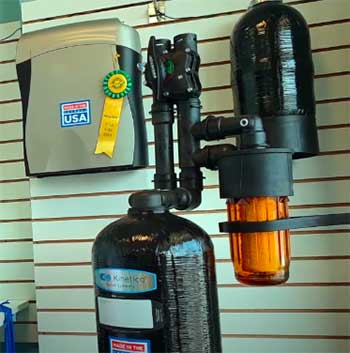
- Installation and Setup: Kinetico is known for its non-electric operation. This means their systems rely on the kinetic energy of flowing water rather than electricity, which can make installation and long-term upkeep simpler. In contrast, some Leaf water systems may integrate more complex electronic components, and that can translate into more opportunities for something to go wrong. Given the mixed reviews on Leaf’s installation quality, the idea of a simpler, electricity-free system from Kinetico might be appealing.
- Service and Support: Customer feedback suggests that Kinetico often provides more consistent service. While no company is perfect, I’ve read fewer complaints about tardy technicians or unresponsiveness. With Leaf, there’s a pattern of customers feeling left in the dark post-installation, which is concerning. If reliable support is critical for you, Kinetico might have the upper hand.
- Quality and Performance: Kinetico systems are praised for durability and long filter life. They’re also widely known for effective softening and filtration. While Leaf claims similar benefits, it’s hard to ignore reviews that mention murky water and unresolved issues. If you value proven performance and fewer service headaches, Kinetico seems like a safer bet.
Leaf Water Systems Vs. Pelican Water Systems
Another strong contender is Pelican Water Systems, a brand that frequently appears on “best of” lists. Let’s look at how Pelican measures up against Leaf.
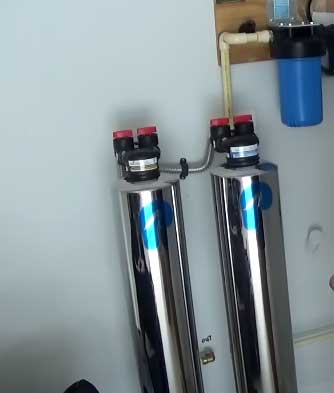
- Installation Experience: Pelican Water Systems are often described as easier to set up, either by a professional plumber or even handy homeowners. Their designs tend to be straightforward, and instructions clear. While Leaf might promise a hassle-free installation, some customers have reported incomplete setups and poor workmanship. With Pelican, the chance of a smoother initial experience seems higher.
- Customer Service: Pelican (now under the Pentair umbrella) usually responds promptly to customer inquiries. Compared to Leaf’s pattern of delayed or non-existent follow-ups, Pelican feels like a more stable choice. If you don’t want to spend weeks chasing down a service team, Pelican’s track record might put your mind at ease.
- Filtration Effectiveness: Pelican is well-respected for robust filtration. Many users report a significant improvement in taste, clarity, and even feel of their water. While Leaf claims similar benefits, the questionable follow-through on issues makes it hard to trust that you’ll consistently get the high-quality water you’re paying for. With Pelican, you’re more likely to experience a true, measurable upgrade.
Leaf Water Systems Vs. Halo Water Systems
Halo Water Systems is another name you might encounter on your search. Here’s how Halo stacks up against Leaf.
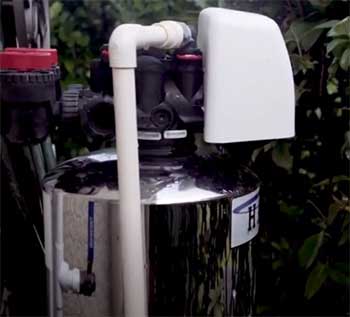
- System Design and Build: Halo’s products are known for their sturdy construction, often featuring stainless steel tanks and top-notch internal components. This durability can lead to fewer maintenance headaches down the line. Leaf’s systems, while possibly constructed from decent materials, have too many reports of shoddy installation and unresolved problems to inspire the same level of confidence.
- Maintenance and Upkeep: Halo systems are designed with relatively low maintenance in mind. They focus on long filter life and user-friendly replacements. Even if you need professional help occasionally, Halo’s clearer support structure can make these visits smoother. With Leaf, the unpredictable quality of service and high fees can eat into any sense of long-term value.
- Overall Reliability: The reputation Halo carries is generally more positive and steady than Leaf’s. While no brand can guarantee a zero-complaint record, Halo’s customer feedback suggests fewer surprises. If reliability is your priority, Halo’s solid reputation might be more reassuring than taking a gamble on Leaf.
Answering Your Burning Questions: FAQ
From what I’ve gathered, Leaf water systems can cost anywhere from a couple thousand dollars into the high four-figure range, depending on the complexity of the system, add-ons like water softeners, and installation fees. The price usually includes the main filtration unit, any additional tanks or filters, and the cost of initial setup. Be prepared to negotiate or shop around—sometimes Leaf reps may offer discounts or financing options, but you’ll want to factor in potential future maintenance and service costs, too.
Leaf Home, the parent company behind Leaf water systems, has been around for several years, though the exact timeline can vary depending on when you count their official launch into the water filtration market. They have experience in home improvement services, which might give them some background credibility. However, longevity in business doesn’t always translate into consistent quality, as the reviews clearly indicate. Age alone doesn’t guarantee reliability.
A whole-house water filtration system (not just Leaf, but industry-wide) generally ranges from around $1,000 to upwards of $5,000 or more. The final cost depends on factors like your home’s size, the complexity of filtration needed, the brand you choose, and whether you’re adding a water softener or a UV purifier. Companies like Aquasana or Pelican might be in the mid to high end of that range but tend to have a better track record, which could justify the higher price.
Leaf Home competes with a variety of brands in the water filtration arena. Names like Culligan, Pelican (Pentair), Aquasana, and SpringWell frequently come up in discussions. These competitors often have stronger reputations for reliability, customer support, and long-term performance. Leaf also faces competition from local plumbing and filtration experts who can customize a solution specifically for your home, often providing more personalized service and better follow-up care.
Reflecting On The Reputation
After looking at everything closely, it’s hard for me to recommend Leaf water systems wholeheartedly. I’ve examined their promises, weighed the pros and cons, and compared them to other major players in the industry.
While Leaf might offer a theoretically effective product, their reported customer service issues, installation woes, and questionable follow-through are simply too big to ignore.
I understand if you’re reading this and thinking, “Maybe that won’t happen to me.” It’s possible you could be one of the lucky customers who gets a smooth installation and decent support. But is that a chance you’re willing to take when there are more reliable brands with better track records?
If you do decide to go with Leaf, at least enter the arrangement with your eyes wide open. Don’t let flashy marketing fool you.
Ask detailed questions, get everything in writing, and consider hiring an independent plumber to oversee the installation process to ensure it’s done right. Still, I’d caution you that you might be setting yourself up for a headache.
Brands like Aquasana or Pelican might cost as much or more, but you’ll likely sleep better at night knowing you’re dealing with a known entity that tries to uphold customer satisfaction.
And if you’ve got the budget and want the ultimate assurance, companies like Culligan have been around the block so many times that they’ve pretty much seen it all—and learned how to do it right.
In the end, whole-house water filtration is supposed to enhance your quality of life, not become a source of frustration and extra expenses.
If Leaf can improve their customer service, installation practices, and product reliability, maybe someday they’ll be worth a stronger endorsement. Until then, I can’t see why you wouldn’t explore other options first.
Wrapping Up
If you’re set on a whole-house filtration system, you might still be tempted to buy Leaf water systems, hoping for that perfect water quality. But given the poor service track record and unresolved issues, I personally wouldn’t recommend it. Other brands seem more consistent and responsive.
Before you buy, think carefully, compare reputable competitors, and consider your long-term satisfaction. Your home’s water should bring you comfort, not headaches and hefty service fees. If you do choose Leaf, do so cautiously and be prepared to advocate hard for yourself.
Your peace of mind—and your water quality—deserve nothing less.

Which system did you finally choose?
Leaf is a money grab. Not just major problems with the gypsies they hire to do the install, my system leaked everytime after they returned to fix it. They had to come back 9 times!! I have documentation. Then when you need to change filters, they won’t sell them to you or tell you where you can get them. The want to come out and charge you more money. You can’t maintain the system yourself, unless you do extensive research to find parts. Soooooo disappointed with what I spent on the POS.